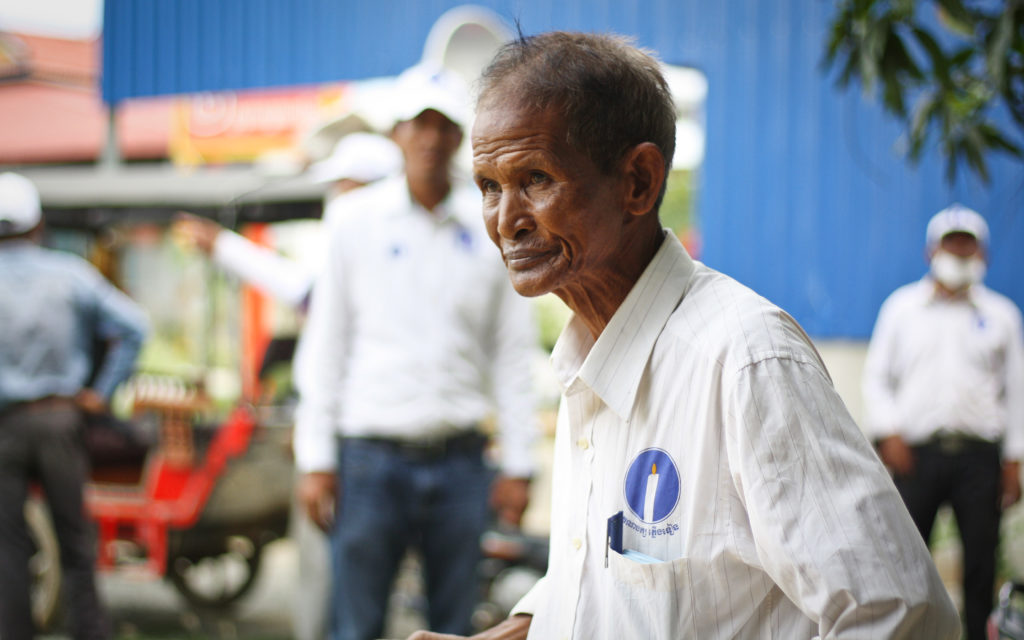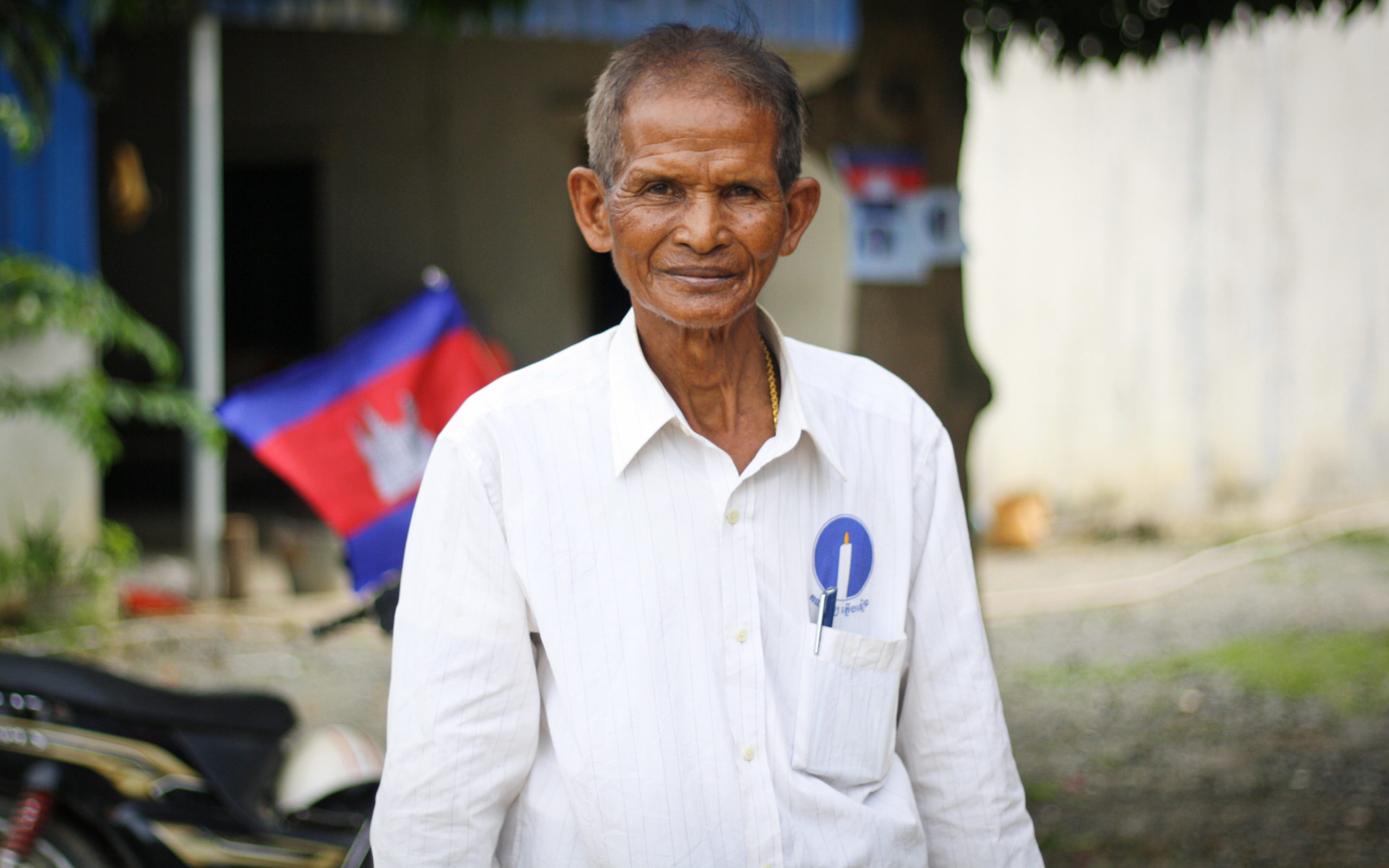Ros Savoeun is the only one who isn’t scared, residents in Doeum Reus commune say.
Savoeun, the commune’s 73-year-old Candlelight candidate, took to the streets on Saturday in party paraphernalia — a button-down shirt with the candlestick logo on the left breast, and a handful of card-sized pamphlets to urge on voters.
He had six others with him, but they were all party officials who came from elsewhere in Kandal Stung district; Savoeun was the lone Doeum Reus resident on the campaign trail.
He drove an old sedan door-to-door, flanked by a tuk-tuk blaring music and slogans.
“We need to win the first position to solve the problems,” he told one resident who then disappeared into her house, and when asked for an interview had a young relative tell reporters that she was busy.
Savoeun’s troubles extended to recruiting election observers for the June 5 vote. There were 17 polling stations in the commune, so he wanted to have one resident in each location volunteering as an observer for Candlelight. He had found eight volunteers, but all of them backed out the day after he registered them with commune authorities. He feared there could have been intimidation related to withholding IDPoor welfare payments.
In the end, he secured just one election observer, a former opposition candidate. Savoeun intended to drive around alone on election day between all 17 polling stations, trying to keep an eye on as much as he could.
“I will be mobile,” the 73-year-old said. “Go to one place, go to another.”
Savoeun’s allegations of intimidation were vague, and he would not put reporters in touch with any of the residents who had backed out from being observers.
But as reporters finished speaking to Savoeun and made a round of the commune to interview residents, a man awaited on the road with a walkie-talkie emblazoned with the logo of the Prime Minister’s Bodyguard Unit. Residents identified him as one of the commune’s village chiefs. The commune is known for its nearby bodyguard base.
He was polite and asked who the reporters were, then smiled and left. As interviews continued around the commune, another man was seen following around on a motorbike. Residents identified him as another village chief.
The penultimate attempt at interviews was at a rice shop on the main road of the commune.
“I don’t dare to talk. People will come and watch us,” one man said.
“This place isn’t a good place to talk about politics,” said another.
Reporters crossed the road to a phone shop and spoke to a couple there. Before long, the village chief who had been following on a motorbike entered the rice shop opposite. He stayed there, periodically looking out to check on the reporters.
When the final interview was done, a commune councilor was waiting outside the phone shop with a younger, burlier man who did not introduce himself.
The councilor said villagers had reported that there were people asking questions, and he wanted to check it wasn’t someone pretending to be a political party. He was also friendly, but took a photo of a reporter’s press card, walked away, and immediately reported into a phone.
Reporters approached over 15 residents over the course of the late afternoon at their shops and homes. Most were reluctant to say anything, acknowledging they intended to vote but claiming they didn’t know anything and would just “follow others.” They were particularly evasive when asked if they knew anything about the Candlelight Party.
Four people spoke at length. The first was a hairdresser, 28-year-old Un Mala, who listed the state’s achievements of building roads, ending war and providing services for people.
“I’m interested in the election and vote every time,” Mala said. A few days prior, the ruling CPP had been campaigning in the commune, and on Saturday he had seen the Candlelight Party, he said.
“Is it a new one? I don’t know anything. I don’t know who’s the boss,” he said of the opposition party.
The second was 67-year-old Sao Nov, who recalled bodyguard unit commander Hing Bun Heang making a speech in the area some years ago. Like Prime Minister Hun Sen, “everything he says is exactly right,” Nov said.
“Because they saved us from the Khmer Rouge, we are grateful to them. I follow the commune chief,” she said.
“The angel will win,” she continued, referring to the ruling CPP’s angel logo. “It has never lost. The others only shout.”
Prime Minister Hun Sen has been in power in Cambodia for more than 30 years, and in 2017 the CPP won Doeum Reus in a landslide with 4,289 of 5,924 votes, or 72%.

The final two people to speak were a couple, ex-Funcinpec soldier Men Lorn and former Funcinpec commune council candidate Khem Phal.
They were the final interview, and watched as their village chief entered the rice shop across the road from them.
“Is that not suppression? Inside they must be scared and worried,” Phal said.
She suspected that those in power would carefully count votes and try to determine who had abstained or voted against them. “Things would go crazy if the results came out and the other side had more. … Here the network is very strong.”
“People are scared. … Their business is to suppress,” her husband Lorn said. “But I won’t betray my conscience.”
Koam Dos, current ruling-party commune chief, denied any intimidation in the commune. “This never happens. We’ve never done this,” Dos said. “Regarding the [allegations of] intimidation, I cannot accept it.”
Dos added, however, that he had been moved down to rank No. 4 on the party’s commune election list this time, meaning he was not in the running for returning as commune chief and was not involved in the election campaigning. The new top-CPP candidate had closer links to the military, he said.
“They needed a strong person, because I am a weak person — my sense of morality is different,” Dos said, without explaining more specifically what the difference in values were.
Bun Heang, the bodyguard unit commander, is among Cambodian generals that the U.S. has sanctioned under the Global Magnitsky Act. The U.S. has alleged that he is “the leader of an entity involved in serious human rights abuse” and is connected to incidents where military force was used against protesters.
Savoeun, the 73-year-old Candlelight candidate, said ruling-party supporters got preferential service from the commune administration, so he understood why people couldn’t openly show support for him.
“If we are successful, it’s OK. But if we fail, they will be in trouble.”












